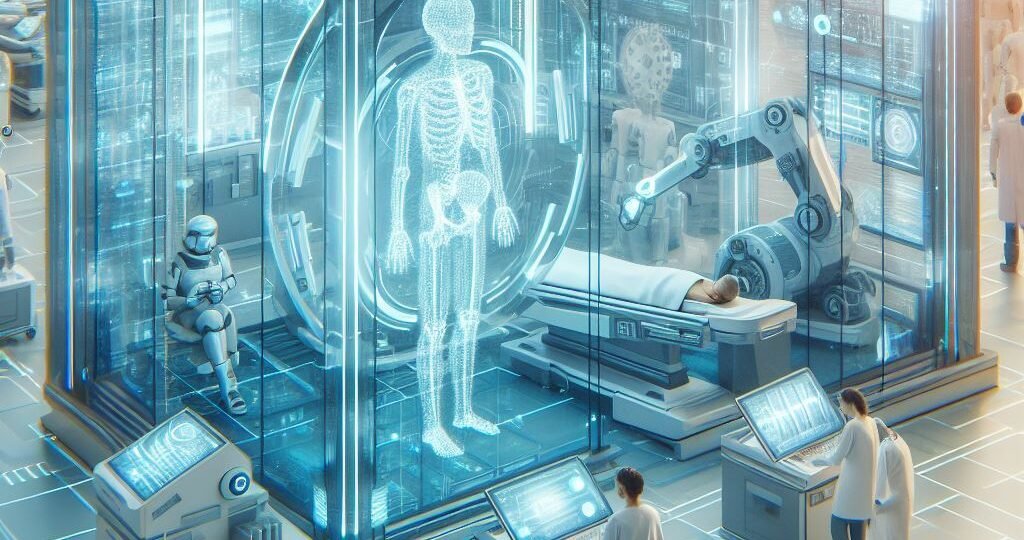The Latest Technological Advancements Revolutionizing the Healthcare Sector
February 1, 2024 | by fakta-unik.com

Technology has been making significant strides in various industries, and the healthcare sector is no exception. In recent years, there have been remarkable advancements in healthcare technology that are transforming the way we approach patient care, medical research, and overall healthcare management. From improving patient outcomes to streamlining administrative tasks, these innovations are revolutionizing the healthcare industry.
Artificial Intelligence (AI) in Healthcare
One of the most exciting developments in healthcare technology is the integration of artificial intelligence (AI). AI has the potential to revolutionize patient care by analyzing vast amounts of healthcare data and providing valuable insights to healthcare professionals. Machine learning algorithms can detect patterns and make predictions, helping doctors diagnose diseases more accurately and develop personalized treatment plans.
AI-powered chatbots are also being used to enhance patient experiences. These virtual assistants can answer patients’ questions, provide basic medical advice, and even schedule appointments, reducing the burden on healthcare staff and improving efficiency.
Internet of Things (IoT) in Healthcare
The Internet of Things (IoT) is another game-changer in the healthcare sector. IoT devices, such as wearable fitness trackers and smart medical devices, are enabling remote patient monitoring and real-time data collection. Patients can now track their vital signs, medication adherence, and activity levels, and healthcare professionals can access this data to monitor patients’ health remotely and intervene when necessary.
IoT devices also help in preventing medical errors and improving patient safety. For instance, smart medication dispensers can remind patients to take their medications at the right time and alert healthcare providers if a dosage is missed.
Telemedicine and Virtual Healthcare
The COVID-19 pandemic has accelerated the adoption of telemedicine and virtual healthcare services. Through video consultations and remote monitoring, patients can receive medical advice, diagnosis, and treatment without leaving their homes. This not only reduces the risk of exposure to infectious diseases but also improves access to healthcare, especially for individuals in remote areas.
Telemedicine also enables healthcare professionals to collaborate and consult with specialists from different geographical locations, leading to better patient outcomes and more efficient healthcare delivery.
Blockchain Technology in Healthcare
Blockchain technology, known for its role in cryptocurrencies, is finding applications in healthcare as well. Blockchain provides a secure and transparent way to store and share medical records, ensuring patient privacy and data integrity. It eliminates the need for intermediaries in data exchange, reducing administrative costs and improving data interoperability.
Furthermore, blockchain can facilitate clinical trials by securely recording and tracking patient consent, data collection, and trial results. This has the potential to accelerate medical research and bring new treatments to market faster.
Robotics and Automation in Healthcare
Robotic technology is making significant advancements in the healthcare sector, particularly in surgery and rehabilitation. Surgical robots can assist surgeons in performing complex procedures with precision, reducing the risk of human error and improving patient safety. Robotic exoskeletons are also being used for rehabilitation purposes, helping patients regain mobility and independence.
Automation is streamlining administrative tasks in healthcare facilities, such as appointment scheduling, billing, and inventory management. This allows healthcare professionals to focus more on patient care and reduces the administrative burden.
Conclusion Healthcare Technology
The healthcare sector is embracing the latest technological advancements to improve patient care, enhance efficiency, and drive medical innovation. Artificial intelligence, Internet of Things, telemedicine, blockchain, robotics, and automation are just a few examples of how technology is transforming the healthcare industry. As these technologies continue to evolve, we can expect even more exciting developments that will shape the future of healthcare.